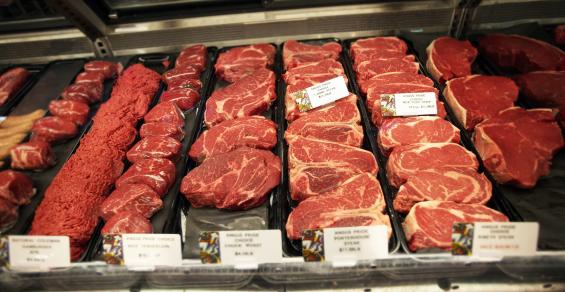The San Francisco, Cal., Board of Supervisors unanimously passed an ordinance this week that requires approximately 120 large grocery retailers in the city to annually report antibiotics used in livestock production, making the city the first in the U.S. to do so. The large grocers affected are those with at least one store in San Francisco and a worldwide total of 25 or more locations, which would include companies like Walmart, Whole Foods, Trader Joe’s and SafeWay. Smaller grocers are allowed to opt in or opt out of the reporting.
The legislation, introduced by city supervisor Jeff Sheehy, states, “The overuse of antibiotics, also known as antimicrobial drugs, in human medicine and in meat and poultry production poses a pressing environmental and public health threat by allowing antibiotic-resistant bacteria to multiply and spread.”
The legislation requires grocers in the city to report information to the Department of the Environment that includes, but is not limited to, the different purposes for which antibiotics are used, whether the use has a third-party certification, the average number of days of antibiotic use per animal, the percentage of animals treated with antibiotics, the number of animals raised and the total volume of antibiotics administered. The reporting is also required to distinguish whether the antibiotics used are medically important or not currently medically important. Once received, the information would be publicly disclosed, via a website, for consumers.
If, at any point, the director determines that a grocer has violated the ordinance, the grocer will receive a warning and then will have 30 days after receipt to correct the violation. Failing to comply could result in the director imposing penalties, including fines and/or the suspension or revocation of any permits held.
The ordinance also includes a section that says the city attorney, a grocer or any nonprofit organization with the tax-exempt 501 (c)(3) or 501 (c)(4) status and “with a primary mission of protecting human health and/or the environment in the San Francisco Bay Area” may bring a civil action to “compel compliance.”
Any grocer who knowingly and willfully violates the ordinance will be guilty of a misdemeanor. Conviction is punishable by a fine of no less than $50 but no more than $500 for each day per violation or by imprisonment in the county jail for a period not to exceed six months; a violation could also result in both a fine and imprisonment. A grocer in violation will also be liable to the city for a civil penalty in an amount not to exceed $1,000 per day per violation.
“Each day in which the violation continues shall constitute a separate violation,” the ordinance states.
“Overuse of antibiotics in meat production is an issue we have been concerned about,” Debbie Raphael, director of the San Francisco Department of the Environment, said when the legislation was initially introduced in June. “Knowledge is power when it comes to our health and the environment.”
Raphael continued, “The public has a right to know whether the raw meat and poultry they purchase is produced using antibiotics in ways that can encourage the proliferation of antibiotic resistant bacteria.”
A variety of stakeholders expressed opposition to the ordinance, including both the California Grocers Assn. (CGA) and the North American Meat Institute (NAMI), which sent letters to the board discouraging the action.
CGA said the ordinance regulates retailers in an “aggressive manner” and claims that the city is using them as a “middleman.”
“Instead of patching together a complicated regulatory scheme which will be hoisted on retailers without control over antibiotic use or without access to antibiotic use information, we encourage the city to compel the information directly from the producer,” CGA wrote, adding that this suggested approach would ensure accurate and verifiable information.
In a letter sent prior to the vote, NAMI argued that the ordinance would be a “recipe for failure” because it would put livestock and poultry producers whose products are sold in the city, processors and packers at a competitive disadvantage due to the recordkeeping necessary to comply. NAMI further pointed out that meat that eventually arrives in San Francisco could come from other states as well as other countries, making the whole process of recordkeeping burdensome to all involved.
However, the group said it is consumers who ultimately would pay the price in the form of more expensive meat and poultry products.
NAMI also noted that antibiotic use is already being addressed on a national level.
“Earlier this year, the Food & Drug Administration implemented significant changes regarding how antibiotics are used and regulated for animals in the United States. FDA’s new policy eliminates the use of medically important antibiotics for promoting growth in animals and requires all remaining uses to be accomplished under the supervision of a veterinarian. This new policy helps ensure medically important antibiotics are used in food animals only to fight disease under the supervision of a licensed veterinarian,” NAMI explained.
Given the new federal policy and the commitment of the meat and poultry industry to limit antibiotic use, NAMI said the ordinance would result in unnecessary recordkeeping burdens and costs.
“To avoid the red tape and paperwork nightmare that would come from adopting this ordinance, the North American Meat Institute urges rejection of this proposal,” the group emphasized.
David Williams, director of global protein for Informa Economics IEG, said the ordinance would be almost impossible to execute but added that it could be a game changer.
“That will make consumption there change drastically at the retail level,” he said, emphasizing that it’s something the meat industry should keep an eye on as another factor in future changes.
“We all want to know what’s in our food, but the question is what’s possible, what’s obtainable and what’s understandable,” he added.




Leave A Comment